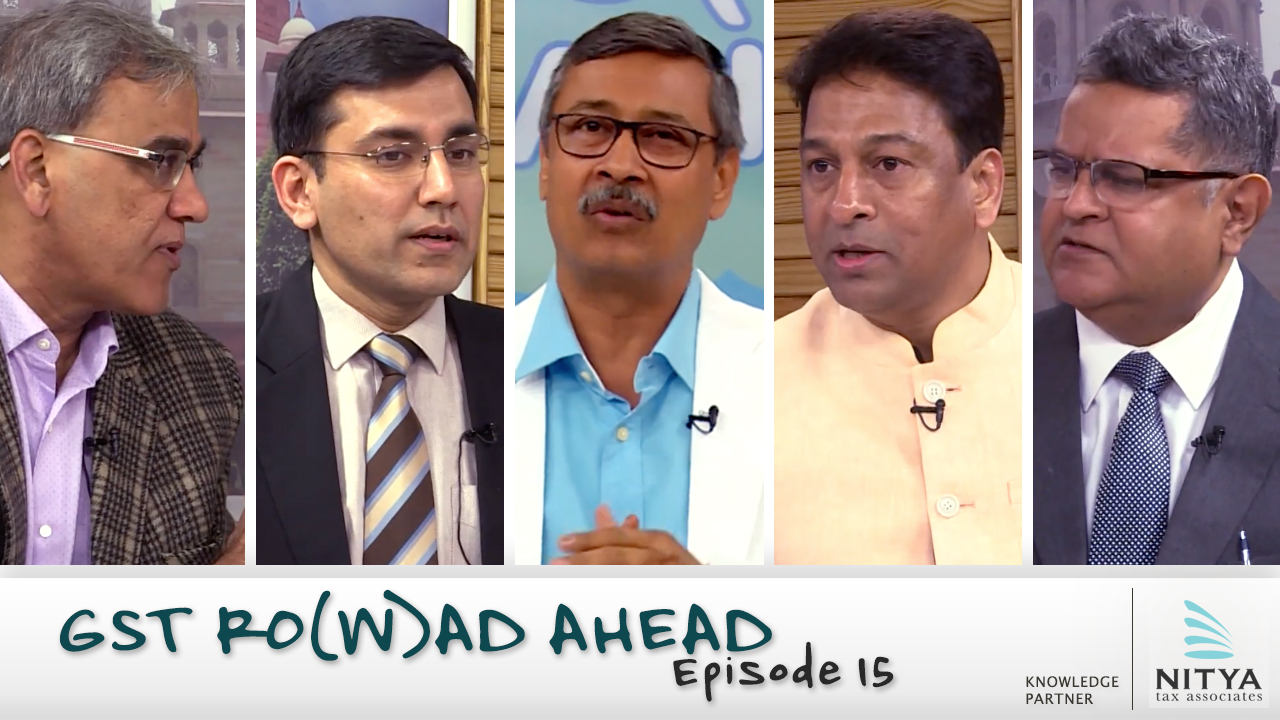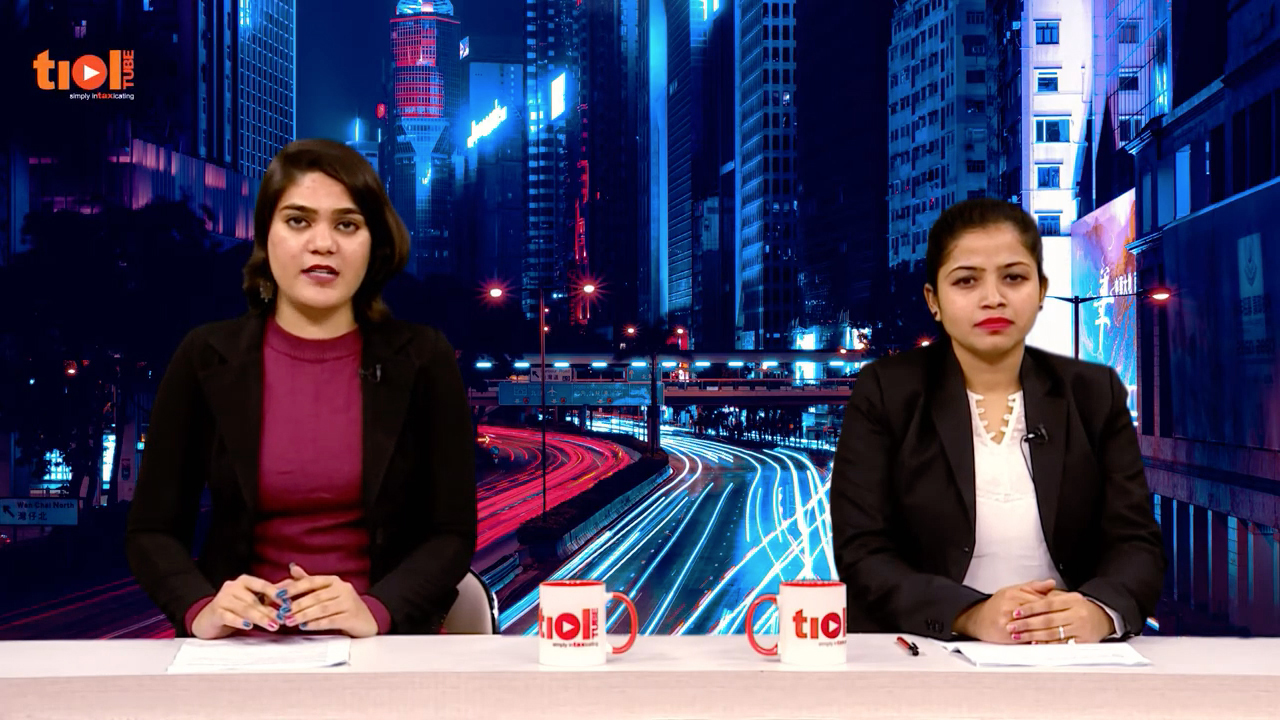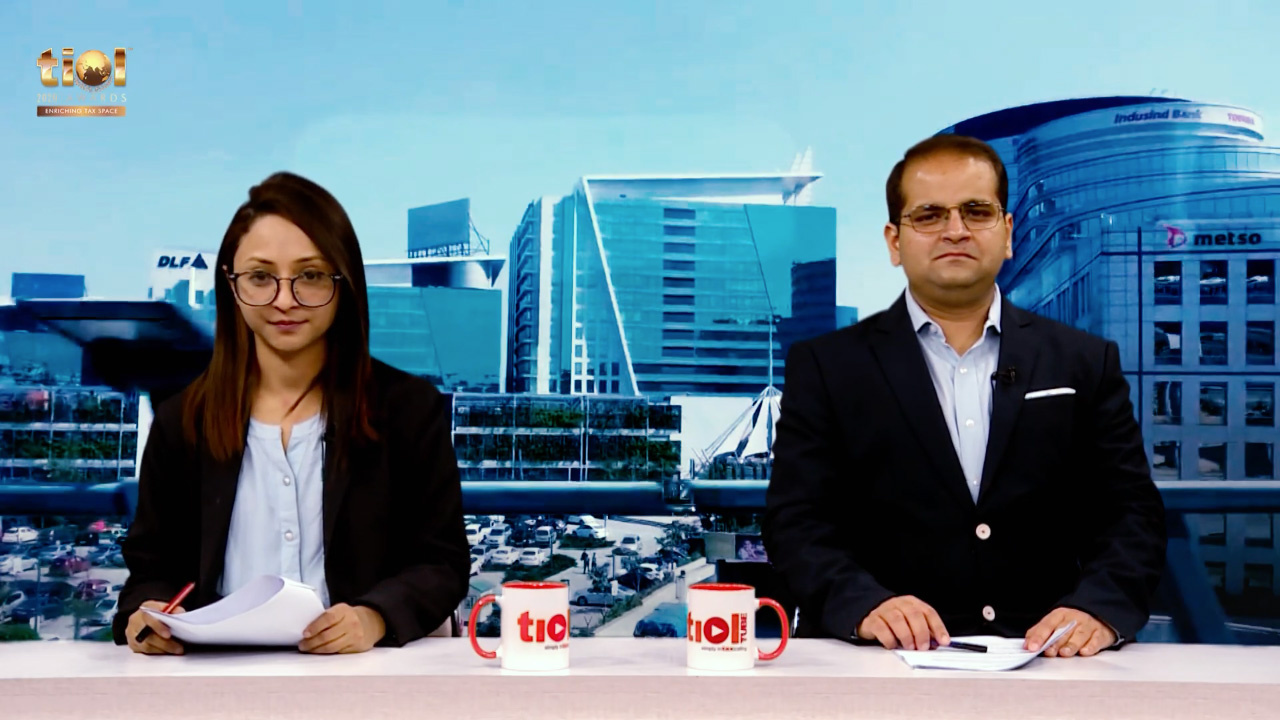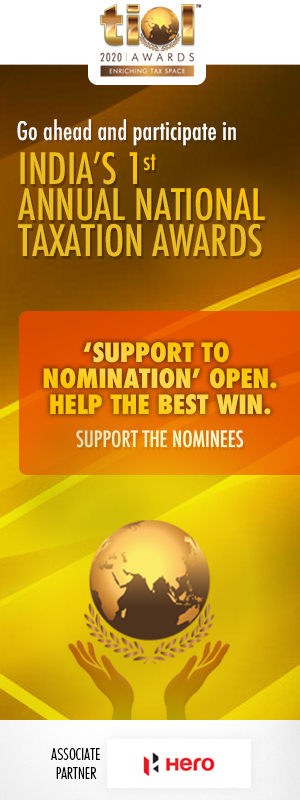| SERVICE TAX
2020-TIOL-876-HC-AHM-ST
CCGST Vs Ahmedabad Municipal Transport Service
ST - During the relevant period, an assessment order was passed in respect of the assessee, whereupon short paid duty was levied under proviso to Section 73(1) r/w Section 68 of the Finance Act 1994 - The duty alreadyd paid by the assessee was appropriated - Demand was interest was raised as well u/s 75 of the Act - Demand was also raised for the recovery of excess amount of CENVAT credit availed by the assessee, u/s 73(1) of the Finance Act r/w Rule 14 of CCR 2004 - Interest thereon was demanded as well - Penalty was imposed u/s 76 of the Act and u/s 77(2) of the Act as well, for failure to assess the correct taxable value and for not showing the same in the ST-3 returns - Penalty was also imposed u/s 78 of the Finance Act 1994 - Such findings were quashed by the Tribunal which then allowed relief to the assessee - Hence the present appeal by the Revenue.
Held - The present appeal is not maintainable in view of the Instructions issued by the Ministry of Finance in respect of the monetary limit - In the present case, there is no challenge to the constitutional validity of any particular Provision, Act or Rule nor there is any challenge to the legality, validity of any Notification/Instruction/Order or Circular - Hence the Instruction dated 17th August 2011 referred to in the Instruction dated 22nd August 2019 will have no application - Hence the appeal is disposed of leaving the substantial question of law open: HC
- GUJARAT HIGH COURT
2020-TIOL-649-CESTAT-MUM
State Street Syntel Services Pvt Ltd Vs CCGST
ST - Rule 5 of CCR, 2004 - Issue is whether the appellant is entitled for refund of Swachh Bharat Cess (SBC) paid on the input services used for providing export service - Claim was rejected by the Adjudicating Authority on the ground that there is no provision for refund of Swachh Bharat Cess paid on the input services used for providing export service - as Commissioner(A) upheld this order, the assessee is before the CESTAT.
Held: Issue involved is no more res integra in view of the decision of Tribunal vide Order No. A/85863/2019 dated 9.5.2019 in Appeal No. ST/88272/2018, State Street Syntel Services Pvt. Ltd. vs. Commr.of Central GST& Central Excise, Mumbai and Order Nos. 86100-86102/2019 dated 14.6.2019 in Service Tax Appeal Nos. 88002-88003/2018 & 88012/2018, M/s. State Street Syntel Services Pvt. Ltd. vs. Commr.of CGST, Navi Mumbai in which this Tribunal while discussing Section 119 of the Finance Act, 2015 and various case laws, by a detailed order, allowed the Appeal filed by the Appellants therein and held that the Swachh Bharat Cess paid on input services has to be available as Cenvat Credit and the same can be discharged by utilizing Cenvat Credit and the appellant therein are entitle for refund of it - following the same, impugned orders are set aside and appeals are allowed with consequential relief: CESTAT [para 4, 6]
- Appeals allowed: MUMBAI CESTAT
Societe Generale Global Solutions Centre Pvt Ltd Vs CCT
ST - Refund - Notification No.12/2013-ST dt. 01/07/2013 - Commissioner(Appeals) has partly allowed the refund claims filed by the appellant and remanded the matter to the original authority for conducting verification - appeal to CESTAT.
Held: Appellant is a SEZ unit and as per Section 26 read with Rule 31 of SEZ Rules, 2006 along with Section 51 of SEZ Act, the SEZ Act has overriding impact over other laws and other SEZ units are exempt from payment of service tax for any service which is used for authorized operations - In the impugned order, refunds have been rejected on the ground that some of the services are not covered in the default list of services whereas factually those services are very much covered in the approved list of services issued by the office of the Development Commissioner which has been placed on record - Further, those services which are not specifically approved but the said services are used for authorized operations of the company appellant are still be eligible for the refund in view of the Section 26 and Section 51 of the SEZ Act and the case laws cited - in respect of certain appeals, refund claims have been rejected on the ground that the appellant has not produced copy of the invoices whereas the appellant has submitted that they have submitted the copy of the invoices - Bench is of the considered opinion that the impugned order is not sustainable in law and, therefore, the same is set aside by allowing the appeals of the appellant - matter is remanded to the original authority to verify the invoices allegedly not produced before the authorities earlier: CESTAT [para 6.1, 6.2, 7]
- Appeals allowed: BANGALORE CESTAT
CENTRAL EXCISE
2020-TIOL-874-HC-AHM-CX
Anand Steel Rolling Works pvt Ltd Vs CCE & C
CX - The assessee is a steel rolling mill, which opted for payment of duty on the rolled products - It filed declaration u/s 3A of the CEA 1944 for determination of Annual Capacity of Production - The assessee declared to having two rolling stands corresponding to each furnace and that the various parameters of both the rolling mills were as per the terms prescribed under Notification No 32/97-CE(NT) issued u/s 3A of the Act - In the declaration it was stated that the second mill was not operational since 12 years and that the company seldom used the stands of the mill for purpose of roughing of scrap for the small mill - Thereafter, the Commissioner held that the capacity of the assessee's factory was to be determined based on the capacity of two mills since two mills were installed in its factory - Later, the Tribunal held that in the case of a factory having two rolling mills installed in a factory, each being independently capable of producing rolled products and even if the second mill is being used sparingly or inefficiently, it will not alter the situation relating to the capacity installed - Hence the present appeal.
Held - The assessee approached the High Court raising the questions as to whether the orders of the Tribunal confirming recovery of duty on the basis of Annual Production Capacity and not on the basis of actual production, would be correct - The assessee also raised the issue as to whether the Tribunal erred in not following its previous decision rendered in another case on the same issue and which was binding upon it - However the High Court admitted the appeal on the first question of law only - The facts reveal that the issue on which the appeal is admitted does not arise from the Order-in-Original in question or the Tribunal's order, as neither of the two considered the issue of recovery of duty on the basis of actual production - Hence there is no need to answer the question arising and the appeal is dismissed: HC
- Assessee's appeal dismissed : GUJARAT HIGH COURT
2020-TIOL-647-CESTAT-MAD
Mobis India Ltd Vs CCE, CGST & CE
CX - Appellant imported Microcat DVD from Australia classifying it under Customs Tariff Heading 8523 - Thereafter, they were repacking the DVDs and selling them as motor vehicle part under tariff heading 8708 and discharging excise duty based on MRP under Section 4A of the Central Excise Act, 1944 by availing CENVAT - department was of the opinion that Microcat DVD is only an electronic "parts catalogue" used by dealers and service agents and packing or repacking of a DVD does not amount to 'manufacture' and, therefore, appellant was not required to pay excise duty at all; that, therefore, the appellant could not have availed any cenvat credit - demand notice seeking recovery of CENVAT credit issued and confirmed by lower authorities, hence appeal before CESTAT.
Held: Undisputedly, all that the appellant had done was repacking the goods and affixing MRP stickers on them - DVDs which appellant has imported were classified under 8523 4080 and this tariff heading is not included in the third schedule, therefore, labelling or relabelling these DVDs will not make them classifiable under a different heading (8708) as has been done by the appellant; that, therefore, by no stretch of imagination can the activity of the appellant be called as 'manufacture' - Therefore, the excise duty paid by the appellant treating this activity as manufacture is clearly not supported by law - Since the final product is not chargeable to excise duty, cenvat credit cannot be availed on the imported DVDs, however, the appellant has filed the returns which they were legally required with the department - Scrutiny of such returns and calling for any further information would have disclosed this fact that appellant was paying the central excise duty wrongly and the department could have directed them not to pay central excise duty accordingly but the department has not done so - Therefore, the demand for reversal of CENVAT credit invoking extended period of limitation does not sustain at all - Period in dispute is October 2009 to September 2012 while the SCN was issued well beyond the normal period on 21.02.2015 when this action of the appellant came to light during the audit - It was equally possible for the assessing officers to have scrutinized returns and found that excise duty was being paid wrongly after availing CENVAT credit: CESTAT [para 9, 10]
CX - Second question is if the assessee has treated the activity of manufacture and paid excise duty thereon and availed cenvat credit, can cenvat credit be subsequently denied by the department holding that the activity was not manufacture in the first place - Karnataka High Court in the case of Vishal Precision Steel Tubes & Strips Pvt. Ltd. - 2017-TIOL-613-HC-KAR-CX has held that cenvat credit cannot be denied under such circumstances - so also, demand of interest thereon as well as proposed penalties do not survive - impugned order is set aside and the appeal is allowed: CESTAT [para 11 to 13]
- Appeal allowed: CHENNAI CESTAT
CX - From April 2004, appellants started packing packaged drinking water - In May 2009, Audit party visited the unit of appellant and in July 2009, the officers from Preventive Unit of the Commissionerate visited the factory and recorded statements - On the basis of said investigation, appellants were issued with a Show Cause Notice dated 03.11.2010 by invoking extended period of limitation stating that appellant had manufactured branded mineral water same was not declared to the Department and the goods were removed without the cover of invoices and without payment of CEX duty - duty demand issued of Rs.98 lakhs - same was confirmed along with equal penalty and amount of Rs.10 lakhs paid was appropriated; interest also imposed - appeal to CESTAT.
Held: Something positive other than mere inaction or failure on the part of the manufacturer, conscious or deliberate withholding of information when the manufacturer knew otherwise is required before the manufacturer is saddled with any liability - In the present case, Revenue has alleged that there was suppression on the part of the appellant due to non-registering themselves with the Department - The said reason is not sufficient to invoke extended period of limitation - When Revenue came to know about the manufacture of packaged drinking water by the appellant in the month of May 2009, then they should have issued Show Cause Notice raising the demand to the appellant within a period of one year from May 2009 - Since the demand was raised after May 2010, i.e. on 03.11.2010, therefore, the same is hit by limitation - impugned order set aside and appeal allowed with consequential relief: CESTAT [para 6, 7]
- Appeal allowed: CHENNAI CESTAT
CUSTOMS
2020-TIOL-88-SC-CUS
CC Vs SAIL
Cus - Dispute in this appeal relates to valuation under the Customs Act, 1962 of import of certain items made by the respondent M/s SAIL under two contracts - These imports were made in connection with modernisation, expansion and modification for their plant at Durgapur in West Bengal - respondents were registered with the customs authorities for the purpose of project import benefits - SAIL wanted import duty to be charged on the plant and equipments alone - The Customs authorities on the other hand added the basic design and engineering fee and supervision charges during manufacture of Indian equipments and for erection, commissioning and performance guarantee tests to the invoice value - In respect of the second contract, direction was made for addition of basic design and engineering fee, as built drawings and supervision charges during manufacture of Indian equipments and for erection, commissioning and performance guarantee tests to the invoice value - In the final orders, the original authority directed the aforesaid additions - The said authority observed that the contractor was entrusted with the work on a turnkey basis, where the entire supplies and services were dependent on each other - On this premise, the provisions of Rule 4 and Rule 9(1)(e) of the Customs Valuation Rules, 1988 was invoked to sustain such additions to the invoice value in respect of both the contracts - Appeals by SAIL were rejected by the Commissioner of Customs (Appeals) by distinguishing the case law in TISCO - 2002-TIOL-07-SC-CUS-LB cited by SAIL – Tribunal by its order dated 22nd May, 2006 held that the drawings and technical documents related to post importation activities for assembly, construction, erection, operation and maintenance of the plant and those items could not be included in the value of imported goods – Revenue is in appeal before the Supreme Court - revenue's contention, which formed the basis of the orders of the authority of the first instance as also the first appellate authority has been that these were turnkey contracts and hence import of designs and drawings etc. even for post-importation activities should be treated as condition of import of the equipments - SAIL had taken specific stand before the authority of the first instance that it was not a condition for them to take design and engineering, which related to post importation activities from the supplier only and in terms of the schedule of the agreement, the purchaser (that is SAIL) had right to change the goods to be supplied by the supplier at any time.
Held: Revenue has not made out a case that the disputed items of contract do not relate to post-importation activities - The statutory provision relied upon by the Revenue to bring the subject-items within the duty net is Rule 9(1)(e) of the 1988 Rules - The expression "condition" [in rule 9(1)(e)], simply put, conveys the idea that something could be done only if another thing was also done - In the given context, it would imply that import of equipments could be allowed by the other party provided the design features for post-importation activities were also obtained from the same supplier or from a firm as per the overseas supplier's direction - But there is no material before the Bench to suggest that import of equipments was effected with simultaneous obligation of SAIL that the designs relating to post-importation activities should also be obtained from the same entity - The revenue has proceeded with the understanding that since both were obtained from the same vendor, condition of obtaining designs etc., for post-importation activities was implicit in the contract - The Revenue has sought to emphasise their case on the basis that as it was a turnkey project, importation of equipments and post-importation project implementation exercise were mutually dependant - In the opinion of the Bench, reading such implied condition into the contracts would be impermissible in the absence of any other material to demonstrate subsistence of such condition - No part of the contract has been shown, from which such condition could be inferred - Necessity of subsistence of such condition has been laid down in the case of Ferodo India (P) Ltd. [ 2008-TIOL-28-SC-CUS ] for invoking rule 9(1)(e) - provisions of Rule 9(1)(e) cannot be automatically applied to every import which has surface features of a turnkey contract - Just because different components of a contract or multiple contracts give the shape of turnkey project to the imported items, without specific finding on existence of "condition" as contemplated in clause 9(1)(e), value of all these components could not be added to arrive at the assessable value - Such an exercise would go against the provisions of Interpretative Note to Rule 4, which is part of the Valuation Rules in view of the provisions of Rule 12 thereof - In the present appeal, involving two import consignments, the authorities of First Instance and the Appellate Authority proceeded on the basis that since all the scheduled items formed part of the same contract and were linked with activities at post-import stage with the imported equipments, the provisions of Rule 9(1)(e) could be invoked - Such reasoning infers subsistence of conditions for awarding post-importation work to the overseas consortia or makes import of both sets of items otherwise interdependent - From the orders in original, it is found that the stand of SAIL was consistent that the subject drawings and specifications did not relate to the equipments imported and was meant for post importation activities and there was no condition laid down that the import of the equipments were to be supplemented by post-importation work – No reason to interfere with the order of the Tribunal – Revenue appeal is dismissed: Supreme Court [para 21, 25, 26, 28, 29] - Appeal dismissed : SUPREME COURT OF INDIA
2020-TIOL-875-HC-AHM-CUS
CCE & C Vs Gujarat Chemical Port Terminal Company Ltd
Cus - The Revenue had filed an application for condonation of 412 day delay in filing appeal before the High Court - The Revenue also furnished an affidavit showing reasonable cause for condonation of delay, claiming that the counsel handling the matters for the Department had resigned - It was also stated that there was a miscommunication on part of the new counsel in respect of filing application for restoration of appeal as well as application for condonation of delay.
Held - The applicant-Revenue has assigned sufficient cause for condonation of 412-day delay in filing appeal - Hence its application is allowed - Tax Appeal No.499 of 2018 is ordered to be restored to its original file: HC
- Revenue's application allowed: GUJARAT HIGH COURT
2020-TIOL-645-CESTAT-MAD
CC Vs Sakthi Sugars Ltd
Cus - Respondents had imported raw sugar which was used for manufacture of sugar and removed on payment of Central Excise duty - As per Section 3 of Sugar Cess Act, 1982, Cess is leviable as the duty of excise on sugar manufactured by any sugar factory - Thus, they have paid sugar cess while removing the manufactured sugar from their factory - The present refund claim relates to the sugar cess paid by them Under Protest on the imported raw sugar - At the time of filing of Bill of Entry, respondents were asked to pay sugar cess as part of the additional duty of customs on the imported goods - The respondent then informed the department that they are not liable to pay sugar cess but nonetheless paid the cess under protest only to have the goods cleared - Thereafter refund claim has been filed but the same was rejected on the twin grounds that the Notification No.S.O. 102 (E) dt. 07.02.2009 exempting levy of CESS on sugar is not applicable and also that since the respondents have not challenged the assessment, they are not eligible for refund - Commissioner(A) held that the respondents eligible for refund - Aggrieved, Revenue is in appeal before CESTAT.
Held:
++ Assessment under Section 17 of Customs Act, 1962 cannot be said to be finalized when respondent has marked the protest while paying duty - The mark of protest is an information to the department that the respondent is not making payment of cess voluntarily and the department has to initiate proceedings to vacate protest and pass speaking order for reassessment - If the department fails to do so, the respondents cannot be put to any disadvantage of rejecting the refund claim: CESTAT [para 7]
++ Board has clarified in a letter dt.10.08.2004 that cess is not a duty of excise - Though there may be decisions in which it is held that sugar cess is also duty of excise, the circular issued by the Board is binding on the department - Commissioner(A) has rightly held that Sugar Cess is not leviable on the imported raw sugar and is leviable on the sugar manufactured by the sugar units in India only - no ground to interfere with the reasoned order passed by Commissioner(A) - Revenue appeal is dismissed: CESTAT [para 8, 9]
- Appeal dismissed: CHENNAI CESTAT
Cus - Appellant imported Zinc Dross Scrub - On physical verification, the goods were found in excess quantity inasmuch as against the declared quantity 19.33 Metric tones, it was found as 22.32 Metric tones - Adjudicating Authority confiscated the excess found goods and imposed redemption fine of Rs. 1 Lakhs and penalty of Rs. 15,000/- as Commissioner(A) upheld this order, appellant is before the CESTAT.
Held: There is no dispute that the imports of the appellant were found in excess - However, there is nothing on record to establish that the appellant had a malafide to import excess quantity - nonetheless, the goods are liable for confiscation - duty attributed to the excess quantity is Rs.1,24,350/- and as against this the redemption fine and penalty is very much exaggerated and needs to be reduced - accordingly, redemption fine of Rs. 1 Lakh is reduced to Rs. 10,000/- and penalty is reduced to Rs. 3,000/- -The appeal is partly allowed in the above terms: CESTAT [para 4, 5]
- Appeal partly allowed: AHMEDABAD CESTAT
|







